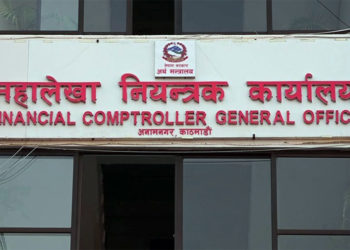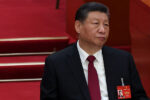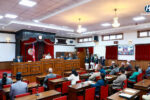KATHMANDU: Economic Digest offers a concise yet comprehensive overview of significant business happenings in Nepal, presented in easily digestible summaries.
The economic landscape of Nepal is experiencing significant shifts, with various sectors facing both challenges and opportunities.
The surge in gold prices, reaching an all-time high of NPR 176,200 per tola, reflects ongoing market volatility. Meanwhile, banks have increased their investment in the construction sector despite economic uncertainties, signaling continued confidence in infrastructure development.
However, the real estate downturn is straining Nepal’s banking sector, leading to rising non-performing loans. Industrial energy supply has stabilized following India’s decision to provide additional electricity, benefiting cement producers and other industries.
The financial sector is also seeing struggles, as life insurance policyholders face difficulties in repaying loan interest. In contrast, Shree Airlines has posted strong growth, highlighting resilience in the aviation industry.
On the political front, pro-monarchy protests have escalated into violence, leading to vandalism and property damage in Kathmandu, prompting police restrictions on movement.
In governance, Minister Prithvi Subba Gurung has emphasized the need for research-driven policies to improve national development planning.
Gold prices hit record high of NPR 176,200 per tola
Gold prices in Nepal reached an all-time high, rising by NPR 1,400 per tola to NPR 176,200 on Friday. This follows a NPR 1,300 increase the previous day. Silver prices have also surged, climbing by NPR 20 per tola to reach NPR 2,040. According to the Nepal Gold and Silver Dealers Federation, the price surge follows a brief decline earlier last week, with market trends pointing toward continued price volatility.
Banks boost construction sector investment by 6.90%
Despite economic challenges, banks have increased investments in the construction sector by 6.90% in the first seven months of the current fiscal year, reaching NPR 201.28 billion.
Nabil Bank led the surge, investing NPR 24.62 billion, reflecting a 12.03% rise from the previous year. NIC Asia and Laxmi Sunrise Banks also contributed significantly, while six banks reduced their investments. This trend suggests that banks still see growth potential in the construction industry despite financial uncertainties.
Real estate downturn strains Nepal’s banking sector
Nepal’s banking and financial sectors are feeling the pressure of a real estate slowdown, as highlighted in Nepal Rastra Bank’s Annual Supervision Report for the 2023/24 fiscal year.
The report attributes rising non-performing loans (NPLs) and non-bank assets to reduced real estate transactions. Factors such as declining purchasing power, weak demand, and inefficient credit utilization have contributed to the NPL increase, which has reached 4.99% for commercial banks by the second quarter of the fiscal year.
SC declines interim order in Kulman Ghising’s case
The Supreme Court has refused to grant an interim order in favor of Kulman Ghising, who was removed as Managing Director of Nepal Electricity Authority (NEA).
Justice Abdul Aziz Musalman has scheduled a hearing for both parties on Sunday. Meanwhile, newly appointed NEA chief Hitendra Dev Shakya has requested the court to resolve his long-standing legal dispute over his previous dismissal. Both petitions are currently under review by the same bench.
India increases electricity supply to Nepal
Nepal’s industries are now receiving 24-hour electricity supply following India’s decision to provide an additional 600 MW of power at night through the Indian Energy Exchange.
This move, achieved through diplomatic efforts by Energy Minister Deepak Khadka and Foreign Minister Dr. Arzu Rana, has put an end to the 12-hour load shedding that had severely impacted Nepal’s industrial sector. The power is being supplied via the Dhalkewar-Muzaffarpur transmission line, stabilizing Nepal’s energy availability.
Cement industry welcomes end of power cuts
The Nepal Cement Producers’ Association has expressed relief over the end of prolonged industrial load shedding. In a statement, the association welcomed India’s decision to supply an extra 600 MW of electricity, emphasizing that power shortages had led to increased production costs, machinery damage, and disruptions in cement manufacturing.
The move is expected to boost employment, revenue, and export prospects in Nepal’s industrial sector.
Life insurance policyholders struggle with loan interest payments
Individuals who have taken loans against life insurance policies are facing difficulties in making regular interest payments. Failure to pay results in capitalized interest, further increasing their debt burden.
Many policyholders are unaware of the mandatory six-month payment schedule due to inadequate communication from insurance companies. Additionally, the NPR 5,000 minimum transaction limit for digital wallets has posed another obstacle, raising concerns over whether these policies genuinely benefit policyholders or merely serve the interests of financial institutions.
Shree Airlines reports 27% revenue growth in first half of fiscal year
Shree Airlines has posted a 27% increase in revenue, reaching NPR 2.57 billion in the first six months of the fiscal year. The airline’s net profit surged by 122% to NPR 357 million.
Its recent fleet expansion, which included three new Q400 turbo-prop aircraft, has enhanced operational efficiency. With a 16% market share, the airline remains focused on profitability despite rising fuel costs, prioritizing long-distance routes for better financial performance.
Royalist protesters vandalize private properties in Kathmandu
Royalist demonstrators have intensified attacks on private properties, including residences, restaurants, media outlets, and supermarkets. Their targets primarily include individuals linked to Prime Minister and CPN-UML Chairman KP Sharma Oli.
Among them, the Bhattarai Supermarket chain, owned by Min Bahadur Gurung, suffered significant damage. Protesters accused Gurung of favoring the ruling party due to his donation of NPR 1 billion for the construction of CPN-UML’s central office. The Bhattbhateini store in Koteshwor was also severely damaged, with windows smashed and parts of the store set on fire.
Minister Gurung calls for research-based development policies
Minister for Communications and Information Technology, Prithvi Subba Gurung, has stressed the need for research-driven policies to ensure effective national development.
Speaking at an event organized by the Nepal Family Court Study, he criticized past haphazard development strategies and emphasized the importance of data-driven approaches in sectors like health and education. He also called for improved budgeting and needs assessment to enhance policy execution.
Pro-monarchy protesters set fire to factory
Pro-monarchy protesters escalated their demonstrations by setting fire to the Jadibuti Factory in Koteshwor following clashes with police near Tinkune. The fire destroyed multiple vehicles inside the factory’s garage.
The violent protest, led by royalist figure Durga Prasai, resulted in extensive vandalism, targeting private homes, media offices—including Kantipur Television and Annapurna Post—and the CPN (Unified Socialist) headquarters. In response, the Kathmandu District Administration has imposed a curfew in the affected area.
Police restrict entry to Kathmandu Valley from Kavrepalanchowk
Kavrepalanchok District Police imposed strict vehicle restrictions, halting all incoming traffic to Kathmandu Valley. Authorities have stopped vehicles at checkpoints in Sanga Bhanjyang, Nala Bhanjyang, and Bhaktundebeshi on the BP Highway.
Similarly, vehicles on the Araniko Highway are being held at Phakhel, as security measures have been tightened in response to ongoing unrest in the capital.









Comment